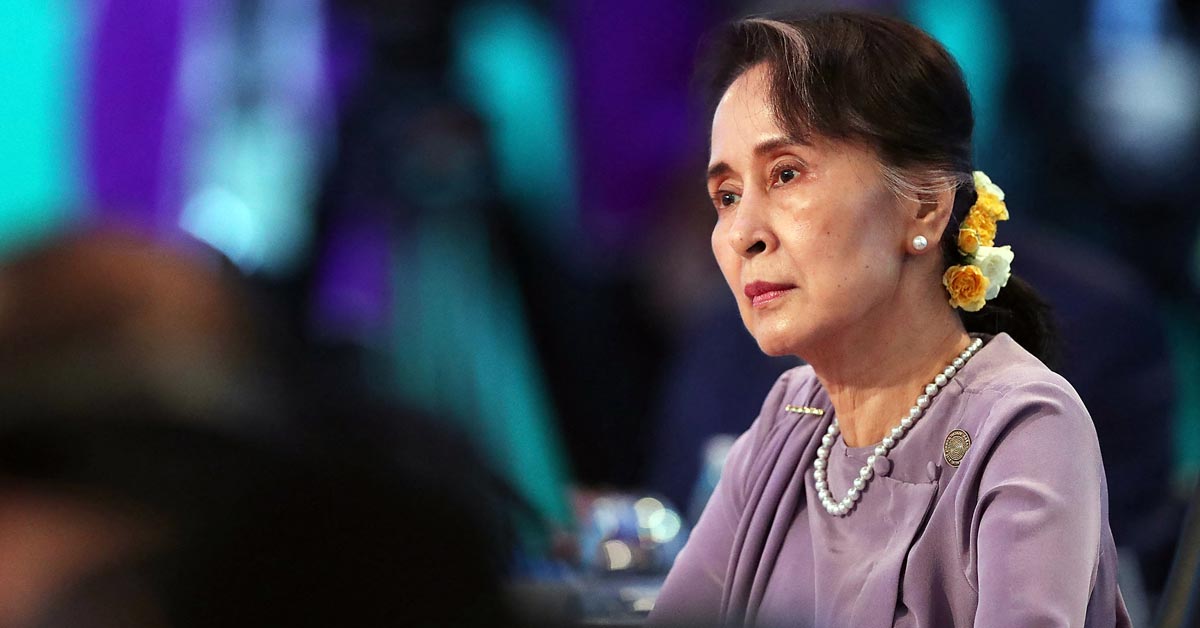Myanmar's ousted leader Aung San Suu Kyi was jailed for two years on Monday after being found guilty of incitement against the military and breaching COVID rules - in a ruling that drew swift international condemnation.
A special court initially sentenced the 76-year-old Nobel laureate to four years in prison, but she was partially "pardoned" hours later by the junta chief, who halved the sentence to two years.
Suu Kyi has been detained since the generals staged a coup and ousted her government on 1 February, ending the Southeast Asian country's brief period of democracy.
She has since been hit with a series of charges, including violating the official secrets act, illegally importing walkie talkies and electoral fraud, and faces decades in prison if convicted on all counts.
Former president Win Myint was also initially jailed for four years on Monday but was also "pardoned" by junta chief Min Aung Hlaing and sentenced to "two years imprisonment", according to a statement read out on state TV.
They will serve their sentences by remaining under house arrest in the capital of Naypyidaw, the statement said, without giving further details.
On Monday evening residents in parts of commercial capital, Yangon banged pots and pans - a practice traditionally associated with driving out evil spirits but which has been used since February to show dissent against the military.
The United States-led international condemnation of the sentences, with Secretary of State Antony Blinken calling the convictions "unjust" and "affronts to democracy and justice".
"We urge the regime to release Aung San Suu Kyi and all those unjustly detained," he said in a statement.
UN rights chief Michelle Bachelet said the conviction "following a sham trial in secretive proceedings before a military-controlled court is nothing but politically-motivated".
The Nobel Committee said it was "concerned" for the 1981 Peace Prize laureate, saying it feared the consequences "for the future of democracy in Myanmar" but also the "impact a long prison term may have on Aung San Suu Kyi personally."
The pardon was "more stage-managed than even the sentencing itself," International Crisis Group's Myanmar senior advisor Richard Horsey told AFP.
"If it was an attempt at magnanimity, it has fallen flat."
Court Gag Order
Suu Kyi's incitement conviction related to statements her National League for Democracy (NLD) party published shortly after the coup condemning the generals' takeover.
The COVID charge is linked to last year's election, which the NLD won in a landslide, but the details are not clear with the government imposing a gag order on the court proceedings.
Journalists have been barred from attending the special court hearings in Naypyidaw and Suu Kyi's lawyers were recently banned from speaking to the media.
In recent weeks, other senior members of the NLD have received long sentences.
A former chief minister was sentenced to 75 years in jail, while a close Suu Kyi aide was jailed for 20.
Suu Kyi also faces multiple corruption charges - each of which carries a possible sentence of 15 years in prison.
Monday's verdict was on "the soft charges which the regime could have spared her but chose not to," independent analyst Soe Myint Aung, told AFP.
"The military seems to have doubled down on its highly oppressive approach toward the NLD and Aung San Suu Kyi herself."
The military, which has dominated life in Myanmar for decades, has defended its coup, claiming fraud allegations in last year's general election.
International pressure on the junta to restore democracy has made no progress, and bloody clashes with anti-coup protesters continue across the country.
On Sunday soldiers in Yangon wounded at least three people after ramming a car into peaceful demonstrators, some of whom were carrying pro-Suu Kyi banners, eyewitnesses said.
State media said one had sustained serious wounds and 11 had been arrested for protesting "without asking for permission".
On Monday the United Nations General Assembly indefinitely shelved the junta's request for recognition, which would see their choice of envoy accredited at the global forum.
The junta has previously criticised the decision not to accredit their ambassador, saying it does not reflect the reality on the ground.
